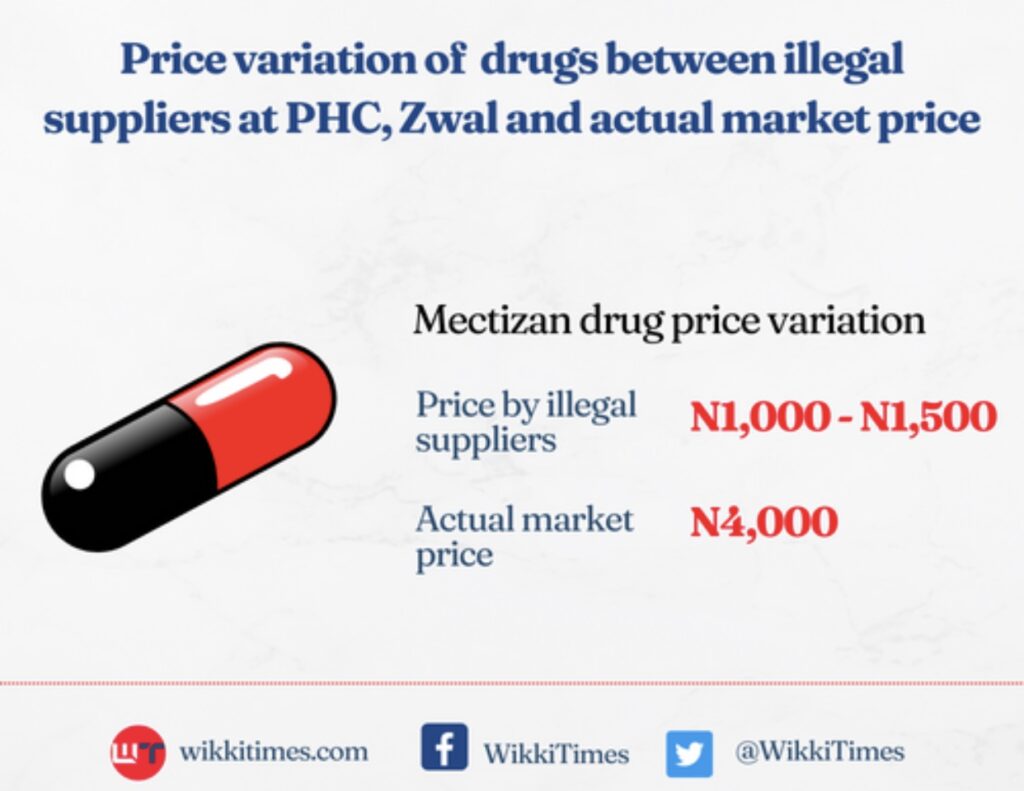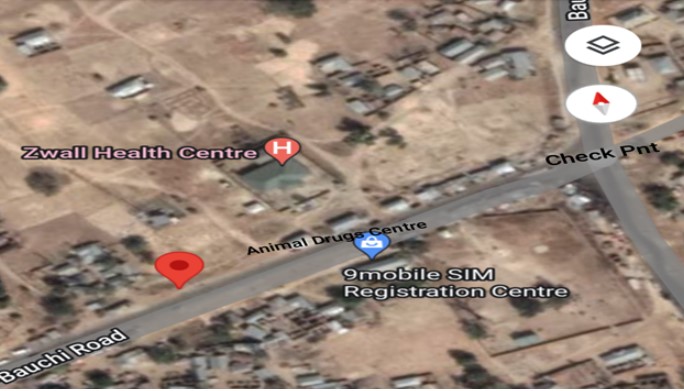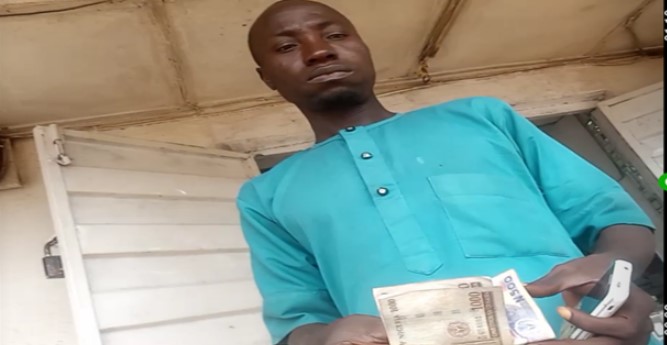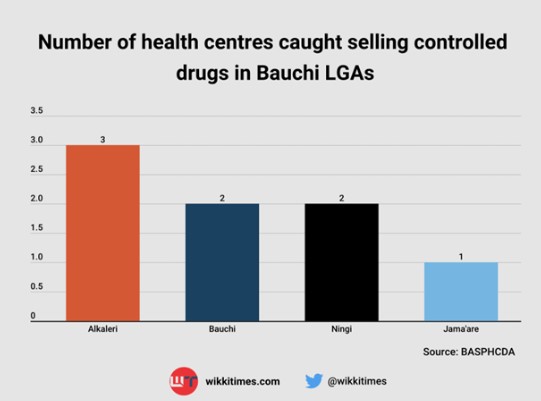NDERCOVER: How Bauchi Health Workers Connive With Drug Vendors To Divert, Sell Medicines Distributed By Government, NGOs
By Usman Babaji
Bauchi State government and a host of non-governmental organisations have for years been distributing both free and subsidised drugs across its healthcare centres to support the less privileged. But the generosity is thwarted by a syndicate of corrupt and selfish healthcare workers who connive with drug vendors to shortchange the Sa’adu Zungur’ talakawas.
In this report, WikkiTimes Usman Babaji went undercover; tracked and documented how the criminal syndicate consistently connive with vendors to divert and sell the drugs; leaving those in need in excruciating pains and forcing them to dive deeply into their pockets to afford treatment. Many who cannot afford it have perished in the process.
Over eight months after the death of his wife, Ado Musa sheds tears on his cheek whenever he recalls what he described as Rahina Abdullahi’s painful exit.
He said Rahina, a mother of four, passed away on December 15, 2021, during childbirth at a Primary Healthcare Centre (PHC) Zwal in Tafawa Balewa Local Government of the State. The 40-year-old man said his late wife who died of complications, was taken to the Centre when she was six months into the pregnancy.
According to Ado Musa, before that fateful day, Rahina was complaining of an abnormal headache. “We took her to the centre with the expectation of getting enough treatment”, however, he said they ended up with what he described as “willful tragedy”.
“Unfortunately, no medical tools to get her diagnosed and no drugs to sustain her treatment.” He said she died about 12 hours later on the way to move her to another hospital.
He argued that before Rahina was taken to another hospital, drugs that were administered to her were bought outside the centre at a high price, “and no free drugs at all,” he attested.
As a pregnant woman, Rahina is entitled to subsidized drugs including malaria drugs, which WikkiTimes understand would have been helpful in diagnosing her ailments. But unfortunately, the drugs constituted part of what the corrupt healthcare personnel divert and sell to vendors.
Substantiating, Ado Musa, A’isha Abubakar recalled how her daughter fell sick and was taken to PHC Burgel-Dass, in Dass Local Government. “Her situation became more adverse, and we had to take her to Dass General Hospital where they again diagnosed her with high-level malaria”.
A’isha added that a similar incident happened to them when she went to Lere PHC in Tafawa Balewa where her grandson was again hospitalized. “Let me tell you that they have not diagnosed her but they kept treating typhoid until when we moved to General hospital Dass, two weeks later”.
Musa, A’isha, and many other residents have one type of pathetic story or another to tell you concerning their ordeals in most of the PHCs because of the shortage of one type of drug or another.
Staff sell drugs to medicine stores owners, decline unknown clients
Chuku Emeka’s shop in Zwal, a community in Tafawa Balewa is a popular destination for diverted drugs. The shop owner has admitted that on several occasions, he has been a beneficiary of the diverted drugs where he buys them cheaply from healthcare workers and sells them at exorbitant prices to unsuspecting members of the public.
He told WikkiTimes that the health workers sell the drugs to only clients they know, presumably to avoid being tracked and punished.
Chuku told this medium that a staff of a healthcare facility brought ten tins of Mectizan (ivermectin) for him to buy whenever the drugs are distributed to healthcare facilities.
“One of them used to sell these drugs to me. He recently brought about ten tins of Mectizan I told him I did not have money. But they hardly sell it to unknown persons”, he remarked.
Emeka said while a tin of Mectizan is sold at N4,000 in the market, the corrupt healthcare workers sell it to vendors at N1,000 or N1,500. “When it is distributed to them, they can collect N1,000 or N1500 (per tin), while in the market a tin is sold at N4,000 now”, he confessed.

A nearby owner of Animal Drugs shop located about ten meters away from Zwal military checkpoint also told this medium that the activities of drugs diversion among healthcare workers in the area are known to many people.
He told this medium that he has one that supplies for him to sell, “Let me call if we can get some. He sells them (mectizan) when he has.”

After his phone call, the drug provider asked him to go home and take the mectizan out, WikkiTimes learnt. “How much do you want to buy each tin?” He inquired as he came back. He placed N3,000 for each tin, however, we settled at N2,500.
“We buy each tin at N3,500 to N4,000 in the market, just because this one is a distributed one that is why we are selling it at this price”.
He confirmed that he abets the staff to make money out of the drugs distributed by mostly NGOs to support the lives of the vulnerable groups in the community.
Saleh Zwal (as displayed by truecaller App), a staff in Zwal Primary Healthcare centre in Tafawa Balewa also confirmed that healthcare workers at the facility were in the habit of selling drugs distributed to support indigent patients.
Saleh said although that is the practice, they are however taking precautions as to who their customer could be, predictably to avoid what he described as “risk involved in the business.”
“It is risky, that’s why we are taking precautions, but I assure you, you will get it”.
He regretted that the centre had been short of free drugs for some months, which led to the pause of the deal for some time.
Saleh explained that more free drugs would be supplied to the centre in the subsequent month, and assured WikkiTimes that they will sell out part of the drugs. “I’m sure by next month you will get the mectizan – they will distribute it soon”, he confirmed.
At Lere, a medicine shop attendant told WikkiTimes to contact one Sa’idu (a healthcare worker in Lere PHC), who he said sells drugs distributed to the centre.
Read: Despite N36.3 Billion In Releases, Gembu-Serti Road In Taraba Still ‘A Death Trap’
When contacted, Sa’idu did not deny the involvement of the centre in that scandalous business. He said the malarial diagnostic tools popularly called Rapid Diagnostic Test (RDT) were available, but “unfortunately, the store attendant is out”. He told this medium that when the attendant is back, RDT will be ready (for sale).
Bala Mararaba, a staff in PHC Mararaban Katagum, a suburb of the Bauchi metropolis told WikkiTimes that some staff in the centre were in the habit of selling drugs distributed to the healthcare centres.
On request for RDT from Bala, he replied, “When they provide it, I will call you so that you come and buy. How many boxes do you need?
Four days later, Bala phoned back, “they are available now, how many boxes do you need, because other people have booked for it already let it not finish”.
Inside a black bag, Bala clinched the two boxes. “There are 25 sachets in each box,” he explained. With two boxes of RDT, the health worker pocketed N4,000.

“We sell them for more than that amount to our clients, just because we are doing it for the first time with you. He promised that if Albendazole tabs (tin) or Mectizan are distributed, “we will make the same deal as well”.

Just two weeks later, Bala called WikkiTimes’ reporter to tell him the availability of another twenty-five boxes of RDT ready to be sold out. He asked the reporter if he needed them. “We need money for 25 boxes. Come and see the sample, is not like the ones you bought previously”.
After presenting one box as a sample, the healthcare worker explained that he was not alone involved in that scandalous business. He mentioned one other staff; Sirajo.
“Sirajo also knows about this deal. He is the one that gave me this sample to present to you. Others are there in the office, I am taking them out to the market if you are not ready, and all of them would be bought (by clients). There is a big bag I would carry them inside, I just want people to go out first”, he disclosed.
About four days later, WikkiTimes contacted Sirajo to confirm whether Bala’s claim that he was also involved in the shoddy business of selling subsidized drugs distributed to support patients. Sirajo confirmed his involvement, explaining that the requested products (RDT) were not available at the time but assured the reporter that whenever they are distributed, they will sell them out.
“We don’t have it now but if you can wait until the government supplies it you will get it. We don’t have it now, just be patient and wait”, he assured.
Just like Liman Katagum Healthcare centre in Bauchi Local Government area, the same shoddy deal was evident in Burgel,-Dass LGA of the state. Sources told WikkiTimes that whenever the products are distributed to the centres, some staff of the facility will surreptitiously sell the drugs and leave innocent patients to buy them whenever they need them.
Drugs vendors connive with distributors
Adamu Sulai (real name concealed because he fear being sacked by his superiors for granting an interview), a medicine store helper, told WikkiTimes how this deal flourish between the staff and their clients. “Now as they (drug dealers) realised that they are being hunted, they connive with some of the voracious distributors to supply them with the products in bulk.
“For instance, my Oga (his boss who owns the shop) has a friend who works in the ministry, he supplies him with these types of drugs. But for fear of being tracked, they change the cartons of the distributed ones and put them into conventional drugs cartons; for instance, TUYIL cartons (a Pharmaceutical company’s brand name) so that everyone will assume that it is just a TUYIL product”.
He said the government stopped distributing some of the drugs free of charge because of the activities of the health staff. “There were astimin, polydirin, for sickle cell patients all were given free before, that’s how our Oga made money”.
Sulai argued that most of the controlled drugs are sold in most of the pharmaceutical shops in the state but not to every buyer, due to precautions they are taking.
He however noted that the Pharmaceutical Council of Nigeria PCN is the most supervising body. They warn, arrest as well as prosecute the erring members, “that’s why we are extra careful”.
Drugs diversion existed for years in most centers
Fa’izu Idrees, a facility In-Charge of one of the Primary Healthcare centres, explained that the illegal diversion of drugs by healthcare workers remains the norm in the state for many years. “Most PHCs in the state are known for selling out health items distributed by governments and NGOs, only a few are excluded”.
According to him, that was the reason the supply was suspended to the state. “Some of these controlled drugs stopped being provided to the state after they discovered that the drugs provided were sold by the health staff because the theft was alarming. The dealers now resorted to buying them from Kano and Gombe. These states still get them and few in the state”.
He recalled that upon his resumption as the facility -In-Charge, he often detected a reduction in the products he signed in after he left.
“But when I requested for clarification, they told me that, that was how they have been doing for long, why do I want to stop them from what they were doing for years”, he noted.
He also predicted that some of the PHCs will soon start selling out mosquito nets as soon as they are distributed in the centres for pregnant women and babies.
WikkiTimes’ findings also revealed that the health workers selling the drugs do not only mislead patients regarding their treatment but also provide the diverted drugs to others for abuse, harming not only the patients but also aiding the proliferation of illicit drugs as well as drug abuse.
Diverted and sold drugs aid abuse, addiction among youths
Adrug addict popularly known as Abdul in the Mararaba community told WikkiTimes that getting controlled drugs was easier for him and many of his cohorts. “Unless if you don’t have money, but if you do, no kinds of drugs that wouldn’t be sold to you. We get them from our regular customers; vendors, medicine store attendants as well as health staff”, he authoritatively revealed.
WikkiTimes’ findings also documented how some drugs addicts in the state find it easy to access controlled drugs.
Our investigation found that the shortage of medical drugs in the health centres was also responsible for deteriorating patients’ situation, compelling them to undue pain and misery.
The drugs known to be exclusive to healthcare centres in markets are sold in most pharmaceutical points at high costs.
This also leads to the infiltration of fake, adulterated and substandard products getting to the final consumer at a high cost.
This medium also found that the availability of controlled drugs in shops, courtesy of corrupt health care workers has revamped drug abuse in the state.
The establishment of the National Policy for Controlled Medicines (NPCM) In 2017, by the Federal Government, was to provide and maintain a healthcare system that allows for increased availability and accessibility to affordable medical needs of the patients across all the health centres across the country.
Similarly, the introduction of the Drugs Revolving Scheme in 2016 in some states was also to assure the availability, and affordability of quality drugs in health facilities. It was also to thwart leakages and corruption in the procurement, distribution, and prescription of drugs to the harmless end-users suffering from one type of pain or another evidently subverted by a corrupt system.
Agency Discovers culprits, recovers over N2.5 million
Dr Rilwanu Mohammed, the Chairman of Bauchi State Primary Healthcare Development Agency (BASPHCDA), confirmed the activities of illegal diversion of drugs by healthcare workers in the state.
He said the agency has discovered seven centres in the state that were involved in the illegality but stressed that “they were penalized accordingly”.
Rilwanu admitted that the agency’s failure to routine monitoring of the facilities at the 349 centres across the state has aided the practice.
He however argued that it was impossible for the agency to monitor all the facilities. “We can’t be monitoring the delivery across the state, but we have set up a committee that goes all over the centres to monitor the implementation of the distribution policy. We are supposed to go round monthly but we don’t have the capacity to be doing that every month”, he said.
Dr Mohammed pointed out that the Bauchi State Drugs and Medical Consumables Management Agency DMMA is responsible for monitoring the delivery of the drugs. “They are mandated to monitor the delivery because they are pharmacists while we are medical. But they are incapacitated to be going to 349 centres monthly”.
Dr Mohammed said both BASPHCDA and DMMA distribute drugs to the centres, but the latter is mostly responsible for monitoring.
However, WikkiTimes’ findings revealed that the Minimum Standards for Primary Healthcare Development Agency in Nigeria stipulated that the agency is to serve as a vital tool for effective supervision, monitoring and evaluation and to aid effective planning, development and delivery of PHC services.
The BASPHCDA Chairman further revealed that two centres were discovered to have been involved in the sale of medical products in Bauchi Local Government, two in Ningi, three in Alkalere and another centre from Jama’are was forced to refund the money while some staff were dismissed.
“We found over seven centres culpable of the deal and we penalised them accordingly. We dismissed one of the staff from the work. Some were transferred to other places while others were sanctioned after a refund of the money.

“For Jama’are Local Government, we forced them to refund the money, Alkaleri has three centres involved and all were punished. But we are unable to monitor what is always going there.”
Dr Rilwanu Mohammed added that “We dismissed four staff from Bauchi Urban Maternity, while Yelwa Domiciliary refunded N500,000. In Ningi Local Government, two centres were forced to refund N1 million each.
Pharmacist Abdulkadir Ahmed, the Managing Director of Bauchi State Drugs and Medical Consumables Management Agency DMMA said the agency is mandated to ensure the delivery of drugs to 349 centres comprising 322 PHCs and 27 general hospitals.
However, he noted that there are some Non-governmental Organisations (NGOs) that distribute drugs to those centres free of charge.
Ahmed added that for conventional drugs that patients use on a daily basis, DMMA buys them from companies and sells them to the centres at subsidized prices affordable to patients. “Only if there is an outbreak of disaster or disease, the government will distribute even such drugs free of charge.
“There are international NGOs that distribute the drugs monthly, USAID for instance. Drugs like child space, RDT, HIV drugs, nutrition drugs, and mectizan, all are distributed to the centres free of charge”.

Ahmed further explained that DMMA, in collaboration with BASPHCDA, the state Ministry of Health and traditional leaders have set up a monitoring committee that would be going across all the centres to monitor the drug distribution and their application for transparency.
Ahmed acknowledged that some of the staff sell off the distributed drugs but vowed that anyone found blameworthy, will face the wrath of the law.
“There are quacks staff among the health workers and anyone found guilty, would be punished accordingly”.
With the persistence of this criminal syndicate shortchanging innocent members of the public, poor patients across Bauchi State face two sad realities—pay high to survive or perish in the process.
This publication is produced with support from the Wole Soyinka Centre for Investigative Journalism (WSCIJ) under the Collaborative Media Engagement for Development Inclusivity and Accountability Project (CMEDIA) funded by the MacArthur Foundation